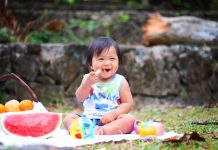
I was very glad to find your website.
My 2-year-old has great problems with constipation. It grieves me to see her so distressed. All the pediatrician told me is to give her prunes and don’t give her apples or bananas. I read on your site that apples (especially the peel) are good for constipation. Do you know why our doctor would tell me not to give her apples?
I live in Japan, and it is difficult to find whole wheat bread and some of the other things you suggested. I will start giving my daughter more bran cereal, fruits and vegetables and hopefully her problem will cease. Thank you.
When young children get diarrhea, doctors used to order a BRAT diet which stands for banana, rice, apple and toast or tea. These foods help to gel liquid stool and reduce the amount of stool. BRAT was intended to be used for a few days only. Apple contains pectin which causes liquids to gel similar to how pectin is used to make jelly from fruit juice. Kaopectate which is often prescribed for diarrhea contains pectin and some doctors may mistakenly think pectin constipates rather than understanding pectin gels liquid stool. Pectin also helps to keep more water in stool thereby preventing hard, compact stools.
If you live in Japan, her food options probably include rice and tea. White rice is low in fiber. Try substituting brown rice.
Serve your daughter 1 cup of fruits and 1 cup of vegetables each day. They can include fresh, cooked, dried or juice versions. When you can find cereal grains such as whole grain cereals (dry or cooked), bread or pasta, serve them instead of the refined grain versions. Oatmeal is a good source of fiber and contains soluble fiber that helps keep more water in the stool to produce softer stools.
Also, remember to offer her fluids such as fruit juice (in addition to apple juice) or water so that she is well hydrated and less likely to suffer constipation due to dehydration. Pay attention to the color of her urine to determine if she needs more fluids. Be patient with your daughter as she may be holding stool because of the pain caused by passing constipated stool.
The latest research indicates high-fat foods contribute to constipation even more than low fiber foods. Typically Japanese menus are low in fat while including a lot of vegetables and fish. Avoid fried foods and typical American fast foods. Your young daughter though does not need to eat a low-fat eating plan, just avoid fried foods which may contribute to constipation.



